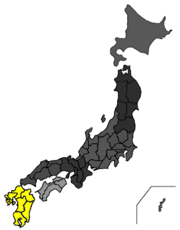Kyushu: Difference between revisions
imported>John Stephenson (start) |
imported>John Stephenson (added map - can be moved when more content is added) |
||
| Line 11: | Line 11: | ||
{{reflist|2}} | {{reflist|2}} | ||
[[Image:Kyushu-Japan-map.png|left|thumb|180px|{{#ifexist:Template:Kyushu-Japan-map.png/credit|{{Kyushu-Japan-map.png/credit}}<br/>|}}Location of Kyushu.]] | |||
==See also== | ==See also== | ||
*[[Fukuoka prefecture]] | *[[Fukuoka prefecture]] | ||
Revision as of 02:57, 7 April 2008
| Japan |
| にほん • 日本 • にっぽん |
| Nihon or Nippon |
| Regions |
| Hokkaido |
| Honshu |
| Tohoku |
| Akita • Aomori • Fukushima |
| Iwate • Miyagi • Yamagata |
| Kanto |
| Chiba • Gunma • Ibaraki |
| Kanagawa • Saitama • Tochigi |
| Tokyo Greater Tokyo Area |
| Chubu |
| Aichi • Fukui • Gifu |
| Ishikawa • Nagano • Niigata |
| Shizuoka • Toyama • Yamanashi |
| Kansai |
| Hyogo • Kyoto • Mie |
| Nara • Osaka |
| Shiga • Wakayama |
| Chugoku |
| Hiroshima • Okayama |
| Shimane • Tottori • Yamaguchi |
| Shikoku |
| Ehime • Kagawa |
| Kochi • Tokushima |
| Kyushu |
| Fukuoka • Kagoshima |
| Kumamoto • Miyazaki |
| Nagasaki • Oita • Saga |
| Ryukyu Islands |
| Okinawa |
| History |
| Culture |
Kyushu (九州 Kyuushuu) is the third-largest and westernmost of the four main islands of Japan. In 2006, 13,316,000 people were recorded as living in its seven prefectures of Fukuoka, Kagoshima, Kumamoto, Miyazaki, Nagasaki, Oita and Saga.[1] This is approximately 11% of the total population of Japan.[2]
Towards the centre of the island is one of Japan's most famous geographical features, the Aso caldera; at the centre is Mount Aso (阿蘇山 Aso-san), the largest active volcano in Japan.
Kyushu is linked to various other parts of Japan by ferries and domestic flights, and bridges also connect the island to Honshu. This allows the national train network to reach the island, including the famous 'bullet train' (新幹線 Shinkansen).[3] Kyushu's own extensive network of roads and railway lines allow easy access to the major cities of Fukuoka, Nagasaki, Oita, Kumamoto and Kagoshima. Ferries from Fukuoka journey to Busan in South Korea and the Japanese island of Tsushima (対馬)[4] in the Korea Strait of the Sea of Japan (日本海 Nihon-kai).[5] Reflecting Kyushu's links to Korea and China, multilingual signs throughout the island usually include Korean, and there is a strong Chinese presence, especially in Nagasaki, home of the Chinese-administered shrine Koshi-byo.
Footnotes
- ↑ Japan Statistical Yearbook: 'Population by Prefecture 1920-2006'. Ministry of Internal Affairs and Communications. .xls document.
- ↑ Some of the Ryukyu Islands are part of Kagoshima prefecture; however, this article deals only with the regions of the main island of Kyushu.
- ↑ Shinkansen services terminate at Hakata (博多), which is the name of Fukuoka railway station. The line is currently being extended southwards.
- ↑ Often called Daemado (대마도) in Korean.
- ↑ Or Nippon-kai; known in South Korea as 동해 Donghae 'Korea East Sea'.

